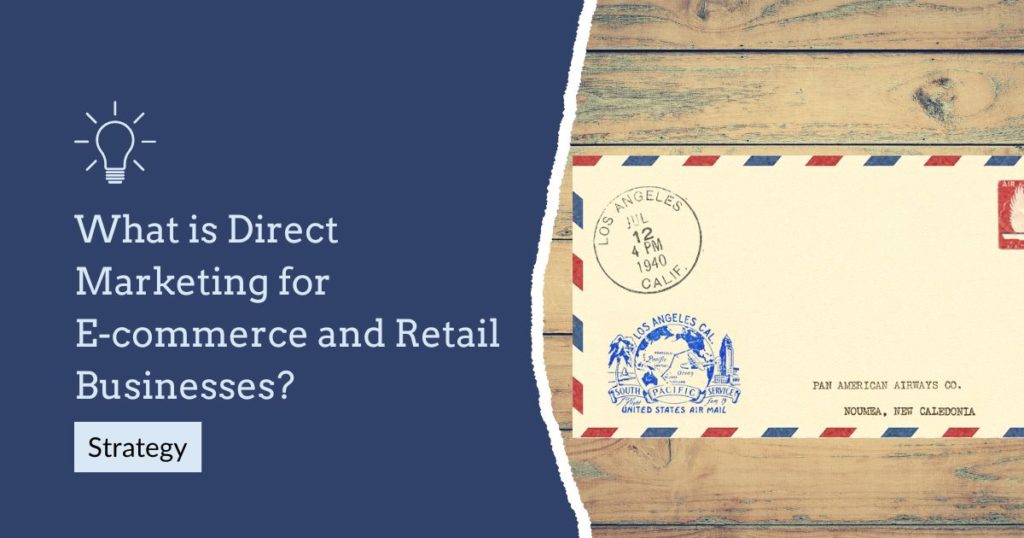The world of e-commerce and retail is busier than ever.
Customers have so much choice at their fingertips, and low-cost mass-market brands like Shein and Temu dominate the market.
Small businesses need to constantly look for strategies that reach their audience and resonate with them on a personal level.
Enter direct marketing—a strategy that’s become indispensable in the e-commerce playbook.
It’s about cutting through the noise to deliver your message directly to the consumer, making it an essential tool for e-commerce and retail businesses aiming for growth. This is a particularly powerful tool when paired with indirect brand awareness marketing.
This post dives into the essence of direct marketing, unravelling why it’s a game-changer for businesses striving to thrive in the digital marketplace.
Understanding Direct Marketing
Direct marketing is a targeted form of marketing that allows businesses to communicate directly with their current and prospective customers through various channels, including email, social media, direct mail, and SMS.
Unlike traditional marketing methods that cast a wide net, direct marketing focuses on building personal connections with individual consumers. It’s about reaching out to people who have shown interest in your brand or products and delivering tailored messages that cater to their specific needs and preferences.
This approach not only enhances customer engagement but also significantly boosts the chances of conversion, making it a powerful tool for e-commerce and retail businesses aiming to stand out in a crowded digital landscape.
Why Direct Marketing?
In the fiercely competitive realms of e-commerce and retail, direct marketing emerges as a beacon of personalised communication, driving deeper customer engagement and loyalty.
Here’s why adopting direct marketing can be a game-changer for your business:
Enhanced Customer Targeting: Direct marketing thrives on precision. By harnessing data insights, businesses can identify and segment their audience based on purchasing behaviour, preferences, and demographics. This targeted approach ensures that your marketing efforts reach the most receptive audience, maximising impact and ROI.
Increased Personalisation and Relevance: Today’s consumers expect brands to understand their needs and offer solutions that resonate with their personal circumstances. Direct marketing empowers businesses to tailor their messages and offers, creating a sense of individual attention that fosters stronger brand connections.
Improved Measurability and Accountability: One of direct marketing’s standout benefits is its inherent measurability. Whether it’s email open rates or SMS conversion rates, direct marketing provides clear metrics that help businesses refine their strategies for better outcomes.
Direct Marketing Channels
Navigating the plethora of direct marketing channels can be daunting. Yet, selecting the right mix is crucial to your strategy’s success. Here’s a closer look at some of the key channels and how they can benefit your e-commerce or retail business:
Email Marketing: With its exceptional ROI, email marketing is a cornerstone of direct marketing. It’s perfect for nurturing leads, announcing new products, and keeping your brand top-of-mind through newsletters and personalised offers.
Social Media Marketing: Platforms like Instagram, Facebook, and Linkedin offer a dynamic way to engage your audience. From targeted ads to direct messaging, social media allows for real-time interaction and feedback.
Direct Mail: In an increasingly digital world, physical mail can cut through the digital clutter. Catalogues, postcards, and flyers offer a tangible touchpoint that can leave a lasting impression.
SMS Marketing: With high open rates, SMS marketing offers an immediacy that other channels can’t match. It’s ideal for time-sensitive offers and reminders that prompt quick action from recipients.
Choosing the proper channels involves understanding your audience’s preferences and where they will most likely engage with your brand. A multi-channel approach often yields the best results, allowing you to cover different touchpoints throughout the customer journey. Adding some form of preference centre can help your customers choose the channels through which they receive marketing messages.
Strategies for Effective Direct Marketing
Creating a strategy for your direct marketing campaign is essential. Here are some strategies to ensure your direct marketing efforts hit the mark:
Develop a Clear Message: Your marketing message should be concise, compelling, and aligned with your brand voice. It must convey the value of your offer and incite action. A singular call to action is usually a good approach.
Segment Your Audience for Targeted Campaigns: Use data analytics to segment your audience into smaller, more defined groups. This allows for more personalised and relevant messaging that resonates with specific interests and needs.
Integrate Direct Marketing with Your Overall Marketing Strategy: Direct marketing should not exist in a vacuum. Integrating it with your broader marketing strategy ensures a cohesive brand experience across all channels.
By adopting these strategies, e-commerce and retail businesses can leverage direct marketing to build meaningful connections, drive sales, and foster loyalty among their customer base.
How Retail & eCommerce Brands Can Embrace Direct Marketing
Direct marketing works across many different types of ecommerce and retail businesses.
Here are some types that stand to benefit significantly from employing direct marketing strategies:
1. Fashion and Apparel:
- Online Fashion Retailers: Can use direct marketing for promoting seasonal collections, exclusive launches, and personalised outfit recommendations based on past purchases.
- Boutique Stores: Small, niche boutiques can build a loyal customer base by sending personalised offers and updates on new stock matching customer preferences.
2. Health and Beauty:
- Beauty and Skincare E-commerce: Can leverage direct marketing to introduce new products, share beauty tips, and send personalised skincare routines.
- Health Supplements Stores: Use direct marketing to educate their audience on health benefits, new research findings, and product recommendations tailored to customer health goals.
3. Electronics and Gadgets:
- Online Electronics Retailers: Direct marketing can help in announcing new tech releases, gadget upgrades, and exclusive sale events for tech enthusiasts.
- Speciality Gadget Shops: Small businesses focusing on niche tech products can use direct marketing to share detailed product insights, usage tips, and special offers to a targeted tech-savvy audience.
4. Home and Lifestyle:
- Home Decor Online Stores: Employ direct marketing to showcase new collections, home styling tips, and exclusive discounts on decor items that align with the customer’s past interests.
- Lifestyle Subscription Services: Subscription boxes for books, gourmet foods, or artisan products can use direct marketing to keep subscribers informed on upcoming box themes and encourage renewals with personalised offers.
5. Food and Beverage:
- Online Gourmet Stores: Can use direct marketing to announce new arrivals, share recipes, and offer discounts on curated selections based on customer purchase history.
- Wine and Craft Beverage Retailers: Specialised stores can send out tasting notes, vineyard stories, and exclusive access to limited-edition releases.
6. Specialty Services and Subscriptions:
- Subscription Services: From meal kits to monthly book clubs, direct marketing can keep customers engaged with previews of the next subscription content and exclusive member deals.
- Customisable Products Services: Businesses offering personalised goods can use direct marketing to inform customers of new customisation options and share user-generated content showcasing customised products.
7. B2B E-commerce:
- Wholesale and Supply Chain Businesses: Can use direct marketing to keep clients informed about inventory updates, bulk order discounts, and industry insights that could impact their operations
- Business e-Commerce: can use direct marketing to segment their products by business type or use case.
These examples illustrate that virtually any e-commerce or retail business, by harnessing the targeted and personalised nature of direct marketing, can enhance customer engagement, improve retention, and boost sales. The key is understanding your audience deeply and tailoring your direct marketing efforts to meet their specific needs and interests.
Challenges and Solutions
Direct marketing, while powerful, comes with its set of challenges. Here’s how to navigate these hurdles effectively:
Overcoming Privacy Concerns: In an era where data privacy is paramount, businesses must tread carefully. Ensure compliance with data protection regulations like GDPR. Transparency about how customer data is used and giving them control over their information builds trust. Also, being too targeted can come across as creepy or land the customer in trouble.
Managing Data Quality: The success of direct marketing hinges on the quality of your data. Regularly updating customer information and cleansing your database of inaccuracies is crucial. Employing data validation tools and encouraging customers to update their details can mitigate this challenge.
Solutions to these challenges lie in respecting customer privacy, adhering to regulations, and maintaining the integrity of data. By doing so, businesses enhance their direct marketing efforts and fortify customer trust.
Conclusion
Direct marketing offers a dynamic and personalised way to reach and engage customers in the e-commerce and retail industry. By focusing on targeted communication, leveraging various channels, and navigating challenges with smart solutions, businesses can achieve remarkable results. Whether it’s through email, social media, direct mail, or SMS, the essence of direct marketing lies in its ability to foster a direct connection with your audience, paving the way for sustained growth and customer loyalty.
Incorporating direct marketing into your overall strategy isn’t just about promoting your products; it’s about creating meaningful interactions that enrich your brand experience. With the right approach, direct marketing can transform the way you connect with your customers, driving both immediate sales and long-term brand allegiance.

